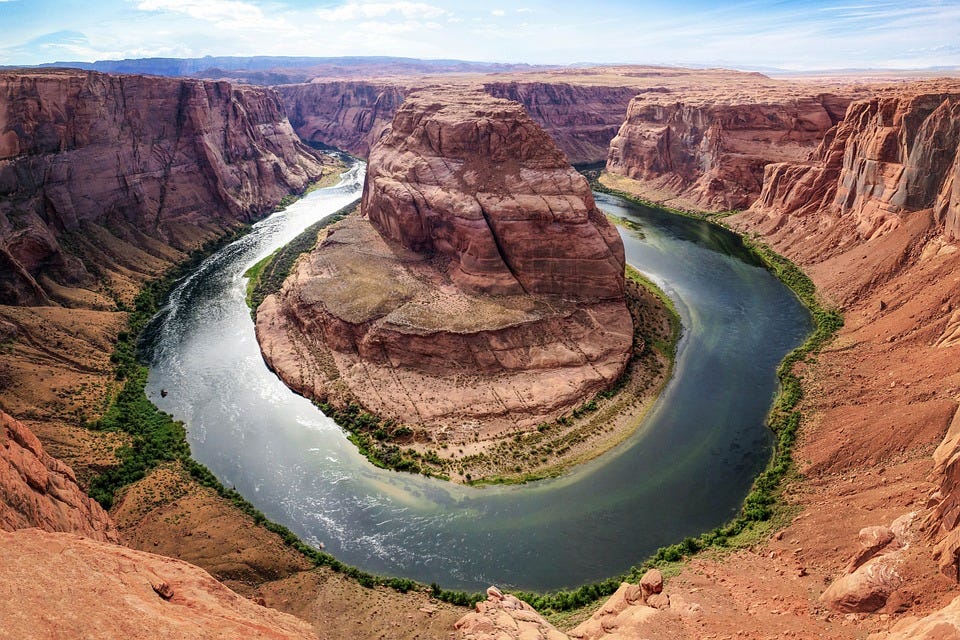Zeus: Water endgame in the West begins to take shape
California holds the cards, but painful cuts are inevitable. Water assets gain in value.
This column is for Callaway Climate Insights subscribers only, but it’s OK to share once in a while. Was it shared with you? Please subscribe.

(David Callaway is founder and Editor-in-Chief of Callaway Climate Insights. He is the former president of the World Editors Forum, Editor-in-Chief of USA Today and MarketWatch, and CEO of TheStreet Inc. His climate columns have appeared in USA Today, The Independent, and New Thinking magazine).
SAN FRANCISCO (Callaway Climate Insights) — During the recent rainstorms here in Northern California I’d often hike up to some trails behind my house between cloudbursts to stare at something I rarely have seen in our neighborhood — water flowing down the hillside.
Coursing through usually dry, dusty pathways and around no-campfire signs, water poured off the hills, down to the street below and into the sewer, where I could hear it roaring toward the San Francisco Bay to be lost forever. Then I’d check my phone for the latest price of my Fidelity Water Sustainability Fund (FLOWX), up 9% in the past three months.
California’s drought-stricken reservoirs filled back up in the past several weeks, and precious snowpack covered the Sierra Nevada mountain range that feeds so much water to the state. But its inability to capture more of the rainwater when it fell highlights the state’s lack of focus on what will soon be its greatest crisis: the Colorado River.
Among the seven states that rely on the Colorado River for precious water, California enjoys senior status, negotiated decades ago. So, in the brinkmanship that governed the recent round of talks, which resulted in the states missing a Jan. 31 federal deadline to come up with a plan to reduce consumption, California held all the cards.
Six of the seven states eventually came up with their own plan to model reductions in water usage, notably excluding California, which said it will come up with its own plan. Nobody wants a federally imposed system of cuts, least of all California’s farmers, which rely on the river for irrigation water to grow the crops that feed the nation. But by relying on its legal status instead of negotiating in good faith, California is playing political chicken with states such as Nevada and Arizona, instead of assuming the leadership it needs to help save the West.
David Callaway explains why this column is called Zeus in The coming battle with the climate gods: How mortal innovators and investors will save the planet.
A lot of this is politics. California Gov. Gavin Newsom is considering running for president next year, and Arizona in particular will be a swing state the Democrats need to capture. Letting it suffer the brunt of water reductions at the hands of the federal government is not in any Democratic candidate’s interest, especially Newsom’s.
But short-term politics can’t deflect attention from the larger crisis that is unfolding out West, which is that it’s unlikely that Lake Mead and Lake Powell, which rely on the river and are losing several inches of water a year, will ever fill back up in our lifetimes. Drastic water reduction cuts are coming for all seven states.
Still, water wars probably won’t be high up the list of top issues in next year’s election season. Chinese balloons and classified documents are sexier. But for the 40 million people who the Colorado River serves, water cuts will soon be a stark reality, and a headache for all politicians — local, state and federal.
As always, the answer lies with technology and investment. Instead of hiding behind legal barriers, California should invest some of its brightest tech minds in helping create ways to reduce water waste. New irrigation systems that recycle water better. Water creation systems such as cloud-seeding and desalination plants. Modern plumbing in states with chronic leaking problems.
An economic water transition, much like the electrification transition we’re witnessing in transportation, will be as big an investment boom if not bigger. Our water economy is taken for granted now, but it won’t be for long. Investors, from Wall Street hedge funds, to retail punters like myself, are taking notice.
All that’s needed now is some leadership to drive the transition and step back from painful battles and water cutbacks. California can do more.
Read more Zeus columns from David Callaway:
Zeus: Fed's shift on climate policy won’t weather the coming storms
Zeus: The coming takeover battles for the climate transition
Follow us . . . .

